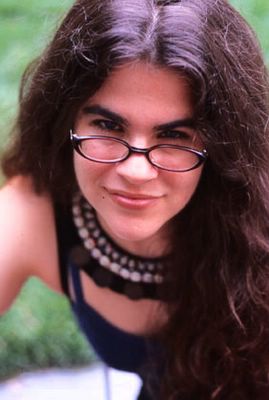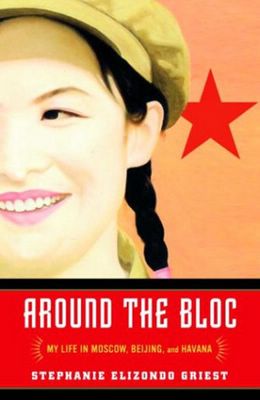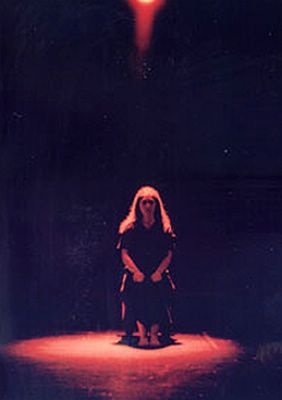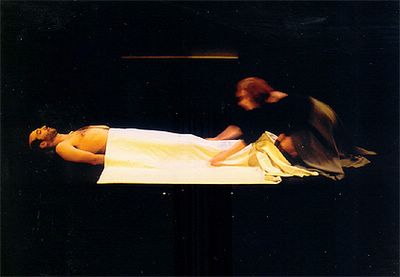
BOOKS/WRITERS
Writers Bloc series
“The Long March”
by Stephanie Elizondo Griest
Author’s Note: The past third of my life has been consumed by a single project: the researching, writing, and selling of my first book, “Around the Bloc: My Life in Moscow, Beijing, and Havana.”
Wanderlust prowls in my genes. My great-great uncle was a hobo who rode the rails; my father drummed his way around the globe with a US Navy Band.
But while I was desperate to escape my hometown in South Texas, I feared I never could -- largely because I couldn’t fathom how.
I mean, I could conceptualize buying a ticket and boarding a plane, but what would I do after it landed?
Then, my senior year in high school, a friend’s neighbor triumphantly returned home after a semester abroad and introduced me to the magical, mystical world of youth hostels, backpacks and "Lonely Planet"
A few months later, I attended a journalism conference that featured a keynote by a rockstar CNN correspondent who’d covered the fall of the Berlin Wall and the collapse of the Soviet Union.
His stories of riots and revolution surprised me. When he finished, I ran up to the microphone and asked how I could be a foreign correspondent, just like him. He looked straight at me and said: “Learn Russian.”
So I did. Although I barely knew enough Spanish to talk to my abuelita, or grandmother, I enrolled in Russian at the University of Texas at Austin that fall and four years later jetted off to Moscow to establish my career as an overseas reporter.
Russia had other plans in store for me, however, and I ended up volunteering at a children’s shelter and falling in love with an ex-soldier.
I set out for China next, hoping to be censored and oppressed and slip political dissidents dumplings filled with subversive messages through the iron bars of their prison cells. Instead, I fought to run the Spice Girls on the entertainment page of the mouthpiece of the Chinese Communist Party.
Those experiences gave me a deep fascination for nations that had experimented with communism in the 20th century.
Between 1996 and 2000, I visited a dozen, unrolling my sleeping bag in the Pamir Alay mountains of Kyrgyzstan and riding a pony across the Inner and Outer Mongolian steppes.
I drank café sua with Vietnamese businessmen in Ho Chi Minh City and cerveza with Cuban hip hop artists who rapped about revolution. I dated a Chinese college student who carted me around on his bicycle.
Mother Road changes each of us in profound ways. I found that as I traveled, the identities I had spent my entire college career cultivating began to peel off one by one: My vegetarianism drowned in a bowl of yak penis soup. I never felt less Chicana than I did in my mother’s homeland Mexico, where my Tex-Mex Spanish was barely intelligible to the people with whom I so badly wanted to connect.
Mother Road has also taught me a thing or two.
Hunger, for instance, was a vague concept until I saw it in a child’s eyes staring me down as I nibbled on a pork dumpling in Burma. I didn’t know desperation until I tripped over it in a crowded bakery, where comrades stole groceries out of one another’s shopping bags.
I found valor among the coffee farmers of Colombia who refused to cave in to guerillas’ demands to turn their crops into cocaine fields. And I experienced true forgiveness from the Vietnamese who so readily welcomed me, a traveler from former enemy turf.
Traveling built within me a foundation that allows me to stroll the world's passageways with confidence. It taught me the difference between being alone and being lonely, and made me ever selective of my company. In fact, Mother Road turned me into such a self-sustained, self-contained unit, I’m expecting to self-pollinate any day now.
I also came to understand the momentousness of the Mexican culture I left behind. All of those former Soviets who risked the gulag to distribute underground samizdat printed in their native language and Tibetans who braved sanctions by continuing to prostrate themselves before their gods had risked so much to maintain their culture.
I, meanwhile, had abandoned mine. They made me question why -- and, moreover, resolve to change it. My future travels will be to Spanish-speaking nations so that I can try to regain all that has been lost in my family’s migration to the United States.

Shown above: “Around the Bloc: My Life in Moscow, Beijing, and Havana.”
However arduous my journey around the bloc, though, it paled in comparison to my navigation of the rocky road of publishing.
I officially began writing my book about my travels on January 8, 1999, in Austin, Texas -- three days after getting dumped by the love of my life (whom I'd moved back to America to be with!).
I was 24 years old, had zero contacts in the publishing industry, and hadn't a clue as to what I was getting myself into.
I did, however, have a lot of discipline, and soon adopted a writing schedule of 7 a.m. to 9:30 a.m. on weekdays, an hour or two of editing weekday evenings, and a four or five-hour block of writing on weekends.
By the time my contract with the Associated Press and apartment lease were up that August, I had completed several dozen travel vignettes and queried my first two rounds of agents.
All ten rejected me, but one gave me invaluable advice: narrow the terrain of the book so that it focused only on communist/post-communist nations, rather than everywhere I'd ever been. My first draft -- tentatively titled “Ramble On” -- had included some 20 countries.
So, I decided to give myself one calendar year to complete the book while living rent and utilities-free with my parents in Corpus Christi.
It was a tough year: having neither a car nor a "day job," I essentially locked myself into a very small bedroom and wrote, researched, and edited between 8 and 12 hours a day.
Yet it proved immensely productive: I completed a 450-page travelogue of 12 Communist nations called “Seeing Red,” wrote five versions of a book proposal, flew out to New York to meet with agents (and signed with a wonderful one), and read every book and Web site on publishing that I could find.
In June 2000, my agent sent the book proposal to 18 publishers. My parents and I took a roadtrip to Mexico and lit velas at every church we passed along the way.
By August, however, every last publisher had rejected it. The day I received my rejection letters in a thick manila envelope, I drank an entire bottle of wine and cried. Had I just wasted a whole year of my life?
Crushed, I did the best thing an aspiring travel writer could in such a situation: hit the road again.
Between August 2000 - May 2001, I drove some 45,000 miles across the nation in a beat-up Honda, documenting U.S. history for a Web site for K-12 students as a national correspondent for “The Odyssey.”
I took “Seeing Red” along for the ride and had the strange but wonderful experience of listening to my colleagues read it as we drove down the highways and byways of America. I also thought a great deal about why the proposal didn't sell, and how I could write one that would.
After that adventure ended, I spent three months performing major reconstructive surgery on my 103-page book proposal so that it read more like a memoir than a travelogue.
Then I moved to New York City with the vow that I would give myself one year to sell it -- or else, I'd go to Kinko's, crank out a bunch of copies to sell to family and friends, and move on.
Amazingly, Villard/Random House bought it in April 2002. My advance, however, was the equivalent of four months’ room and board -- and I still had a full year’s worth of work ahead of me.
And so, at age 27, after having successfully avoided it since high school, I buckled down and got a “day job” as the spokeswoman for a think tank on artistic and intellectual freedom and the founder/director of an anti-censorship youth activist organization.
I generally wrote between 7 a.m. to 9 a.m. and 9 p.m. to midnight on weekdays and logged in at least 15 hours on the weekend.
I also did a two-week residency at the beautiful Ragdale Foundation in Lake Forest, Illinois, where I wrote and edited 12 hours a day.
The book was christened “Around the Bloc” soon after I handed it in on May 1, 2003. It was published on March 9, 2004.
The first time I held my book in my hands, I literally dropped to my knees and cried.
Later that night, after consuming copious amounts of Soviet champagne on Brighton Beach with a friend, I experienced the most blissful inner peace of my life.
All in all, my publishing saga included nine versions of the book proposal, four complete manuscript rewrites, 33 agents and 31 publishers queried, and countless edits, revisions, split ends and nervous breakdowns over a four-year period.
I lost two good friends, most of my savings, and any concept of "free time" in the process. Through the madness, I learned a few lessons about book writing that I’d like to impart:
Deeply reflect upon your reasons for wanting to do this to yourself. Fame and fortune simply cannot be part of the equation -- and frankly, neither can publication. Those rewards are just not worth the struggle.
Rather, you must believe in the story you have to tell, and be fully convinced that it will change the perceptions and perspectives of others. Those are the only goals that can justify the immense amount of work involved in this grueling process.
If you decide to go for it, build a community. If you don’t know any writers, go to conferences or join a group and befriend some. Seek out mentors.
Whenever you read a wonderful book or article, send its author a note and, if they live close by, an invitation for coffee. Sell yourself and your ideas to editors, agents and publishers.
Follow up on every lead and jump on every opportunity. Always write heartfelt thank you letters to those who help you along the way.
Learn from your mistakes, revel in your successes, and above all -- enjoy the journey. You are a thinker, a storyteller, an artist, a writer: OWN IT!
And watch out for the Bloc Party nearest you. I performed excerpts of “Around the Bloc” in 25 cities in 2004 and many more are in store for this year. Please visit my online home at Around The Bloc, and I’ll see you on the road!
© Stephanie Elizondo Griest. Used with permission.
Shown/header image: Stephanie Elizondo Griest; Photo: Viktoriya Drukker
Bio: Stephanie Elizondo Griest has belly danced with Cuban rumba queens, polished Chinese propaganda, and mingled with the Russian mafiya. These and other adventures are the subject of her critically-acclaimed memoir “Around the Bloc: My Life in Moscow, Beijing, and Havana.”
Official site: Stephanie Elizondo Griest
About: The Writers Bloc series is an ongoing column featuring practical advice for writers. Nope, not a support group. Not until someone busts out the tequila, anyway...
Find additional books/writers content, in the FEB/MAR 2005 issue of "Arte Six."


